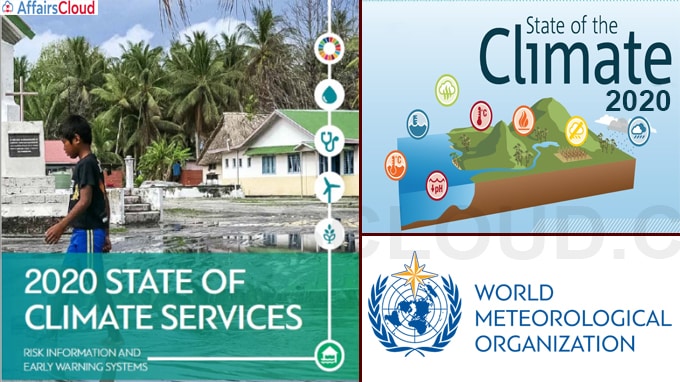 On the occasion of the International Day for Disaster Risk Reduction i.e. on October 13, 2020, the “State of Climate Services 2020 Report: Move from Early Warnings to Early Action” released by United Nations World Meteorological Organization (UN-WMO) which is produced by 16 international agencies and financing institutions.
On the occasion of the International Day for Disaster Risk Reduction i.e. on October 13, 2020, the “State of Climate Services 2020 Report: Move from Early Warnings to Early Action” released by United Nations World Meteorological Organization (UN-WMO) which is produced by 16 international agencies and financing institutions.
- In accordance with the report, over the past 50 years, more than 11,000 disasters caused by weather, climate and water-related hazards, resulting in 2 million deaths and US$ 3.6 trillion in economic losses.
- Notably, the September month was the warmest of 2020 in accordance with the United States (US) National Oceanic and Atmospheric Administration (NOAA). Also, the period between 2016-2020 had been the warmest on record.
Key Points from Report:
-The number of people that require humanitarian assistance will increase by 50% from 108 million people in 2018 which will cost 20 billion USD per year.
-The average number of deaths in the last 50 years has decreased by 50 years.
-Only 40% of WMO members (138) have Multi-Hazard Early Warning Systems (MHEWS) which means globally on average one in three people is still not covered by early warnings.
-Between 1970 and 2019, 79% of disasters worldwide involved weather, water, and climate-related hazards.
-The situation is severe in small island developing states (SIDS) and least developed countries (LDCs). Since 1970, SIDS have lost US$ 153 billion due to weather, climate and water related hazards while 1.4 million people (70% of the total deaths) in LDCs lost their lives.
Recommendations:
The report has outlined six key recommendations to improve the implementation Early Warning Systems (EWS), globally:
- Investment in EWS particularly in African LDCs and SIDS.
- Focus investment on turning early warning information into early action.
- Ensure sustainable financing for early warnings.
- Tracking of finance flows
- Development of more consistency in monitoring and evaluation of EWS.
- Fill the data gaps, particularly in SIDS.
Recent Related News:
- On September 1, 2020, a report “Enhancing Nationally Determined Contributions (NDCs) for Food Systems” published by World Wide Fund (WWF), United Nations Environment Programme (UNEP), non-profit organization EAT & think tank Climate Focus based on strengthening food systems in the age of climate crisis.
- ii. On September 10, 2020, the 74th Session of the United Nations General Assembly (UNGA) High-Level Forum (HLF) on the Culture of Peace which was convened by its President Tijjani Muhammad-Bande and addressed by UN Secretary- General Antonio Guterres on the theme “The Culture of Peace: Change our world for the better in the age of Covid-19”.
About World Meteorological Organization (WMO):
Secretary-General– Professor Petteri Taalas
Headquarter– Geneva, Switzerland




